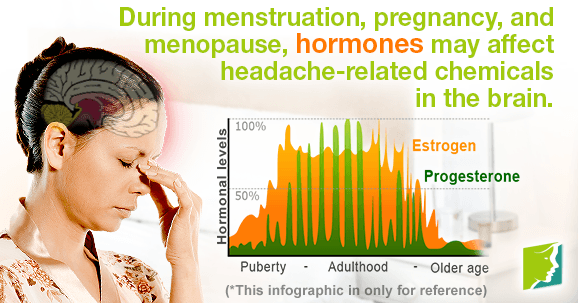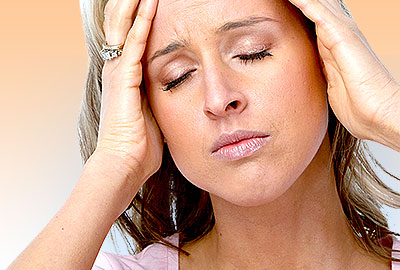Women are five times more likely to get headaches than men, which can be directly linked to hormone imbalance. Chronic headaches are classified by how long they last and how often they occur. They must occur 15 days or more per month for at least three months to be considered chronic. Chronic headaches are characterized as the persistent, everyday headaches that typically last a few hours. The primary cause of headaches in women is hormone fluctuations. When hormone levels fluctuate, it can cause intense pain because blood vessels are constantly expanding and contracting.
Chronic Headaches and Hormones
As previously stated, the primary cause of headaches in women is hormone imbalance. Hormones fluctuate during menstruation, pregnancy, and menopause, which is when women typically report headaches.
Estrogen and progesterone play essential roles in regulating the menstrual cycle and pregnancy. These hormones may affect headache-related chemicals in the brain. Steady estrogen levels may improve headaches. Conversely, estrogen levels that drastically decline can make headaches worse. It is important to try to restore the balance of hormones to prevent headaches.
In addition to hormonal shifts, there are other chronic headache triggers that should be avoided to help prevent them. These environmental triggers include bright lights, strong odors, loud noises, stress, dehydration, insufficient sleep, poor diet, and lack of exercise.
Managing Options
Making lifestyle changes will help balance your hormones and avoid chronic headaches. These changes are:
Drink water
Dehydration is a primary cause of chronic headaches, so it is important to drink plenty of water throughout the day. Staying sufficiently hydrated can help boost energy levels and also reduce the frequency and intensity of headaches. Avoid drinking excessive amounts of alcohol and caffeine, which are known to significantly dehydrate the body.
Exercise
Studies have shown that exercise can significantly increase energy levels, relieve stress, and improve the efficiency of the heart, lungs, and muscles. Additionally, regular exercise helps you get better sleep and releases endorphins in the brain, which improve mood. Yoga, swimming, and walking are all great low-intensity forms of exercise that can help prevent chronic headaches.
Eat healthy
Eating small, healthy meals and snacks every three to four hours is recommended for preventing headaches and optimal energy. Since low blood sugar is a leading cause of chronic headaches, it is important to eat healthy and often in order to prevent them. Foods high in sodium and saturated fats should be avoided in order to prevent chronic headaches.
Sleep
Inadequate sleep can lead to chronic headaches. The average adult needs between seven and eight hours of sleep each night. Helpful ways to relax and get a good night's rest are soaking in a warm bath, reading, or meditating. Trying these methods before bed may help calm and clear a restless mind. It is important to keep in mind that oversleeping is counter-productive, and can also cause drowsiness and headaches.
Treating the Root Cause
Women are five times more likely to get chronic headaches than men because of hormone fluctuations experienced during menstruation, pregnancy, and menopause. Exercising regularly, staying hydrated, and sleep properly can help prevent chronic headaches. If the headaches continue, it is best to see a doctor to rule out an underlying condition.
Sources
- Mayo Clinic Staff. (2012). Chronic daily headaches. Retrieved October 29, 2014, from http://www.mayoclinic.org/diseases-conditions/chronic-daily-headaches/basics/symptoms/con-20025386
- National Health Service UK. (2013). Hormone headaches. Retrieved October 29, 2014, from http://www.nhs.uk/livewell/headaches/pages/hormonalheadaches.aspx
- Office on Women's Health. (2012). Migraine fact sheet. Retrieved October 29, 2014, from http://www.womenshealth.gov/publications/our-publications/fact-sheet/migraine.html#n




